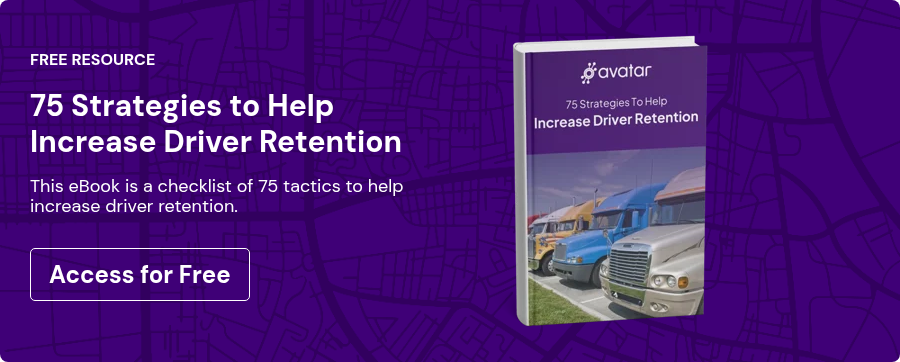What Is Driver Turnover? And How to Avoid It | AvatarFleet
Mark G. Gardner
February 23, 2017
Our recent webinar with the Ohio Trucking Association discussing driver retention has had a lot of people asking us just what is driver turnover and what causes it? Maybe, if we can all agree on what driver turnover is and what causes it, then we might be able to do something about it.
Two Kinds of Turnover
There are actually two kinds of turnover: good turnover and bad turnover. Good turnover happens when you part ways with a poor performer. As our current president used to shout on his reality TV show The Apprentice, “you’re fired!” Of course, you probably shouldn’t have hired a poor performer in the first place, but maybe you got bamboozled by a slick talker. Or maybe, you looked at the wrong criteria when hiring him; things like a CDL-A, two years over-the-road experience and the ability to pass a drug test. Sure, these are important, even required, but not very predictive of on-the-job success, let alone longevity.
Bad turnover happens when an otherwise safe, professional, and productive driver comes in one day and, in the words of the immortal Johnny Paycheck, declares, “you can take this job and shove it.” Bad turnover happens every day. It’s the malignant cancer of the trucking industry. It’s expensive, disruptive, and frustrating and just about everyone suffers from too much of it. So the question is, why does bad turnover happen?
The Psychology of a Truck Driver
Before diving into fixing driver turnover on the webinar, we wanted everyone to better understand the problem from a general point of view. In fact, we wanted to provide everyone with a four year degree in psychology, but we didn’t have enough time. So, we shared a single slide to explain the entire science of psychology in one minute:
People do things to get rewards. Conversely, people do things to avoid punishments.Okay, that’s arguably about as simple as you can make a four year college degree. But it explains human behavior and it’s absolutely true. It’s also true of truck drivers. They join you to get rewards. You might not think about it this way, but it is exactly what happens when a driver says yes to your recruiter. They join you to get:
- A job they like
- Quality work life
- Good pay
- Attention & respect
- A voice at the table
These are all forms of rewards.
The Job Isn’t What I Expected
So truck drivers do things, such as working for you, to get rewards. Why, then, would they ever quit? The answer is actually very simple and consistent with human behavior theory: to get rewards. Somehow, on their very first day, you convinced them they’d like the job, get good pay, attention, respect, and a voice at the table, but then you didn’t deliver. You didn’t deliver, so the driver gives you a Top 10 Reason Drivers Quit: The Job Isn’t What I Expected.
That’s right. If the shoe fits, wear it. Don’t blame the driver. Go look in the mirror and ask yourself, where did we go wrong? What did we promise on day one that, somewhere along the line, we failed to deliver on? Was it good pay? Adequate home time? Appreciation and respect? What happened?
If you’re honest with yourself and willing to accept the premise that they left because you didn’t deliver on something, then you’re in a position to fix it. Perception is reality. You probably told the driver your expectations, but they missed something or did not understand.
Quick Tip To Set Expectations:
On day one, create a simple one-page document that outlines your expectations of the driver and the driver’s expectations from the driver manager. Make this a living document by checking in weekly during the first 90 days and referencing specific items on the document. Have the driver review it weekly and confirm both parties are still meeting expectations.
To get more tactics on how to properly set expectations and reduce driver turnover, download our eBook: 75 Strategies to Help Increase Driver Retention.
Sign up for our newsletter
Get the latest articles on all things transportation delivered straight to your inbox.
Schedule a live demo

